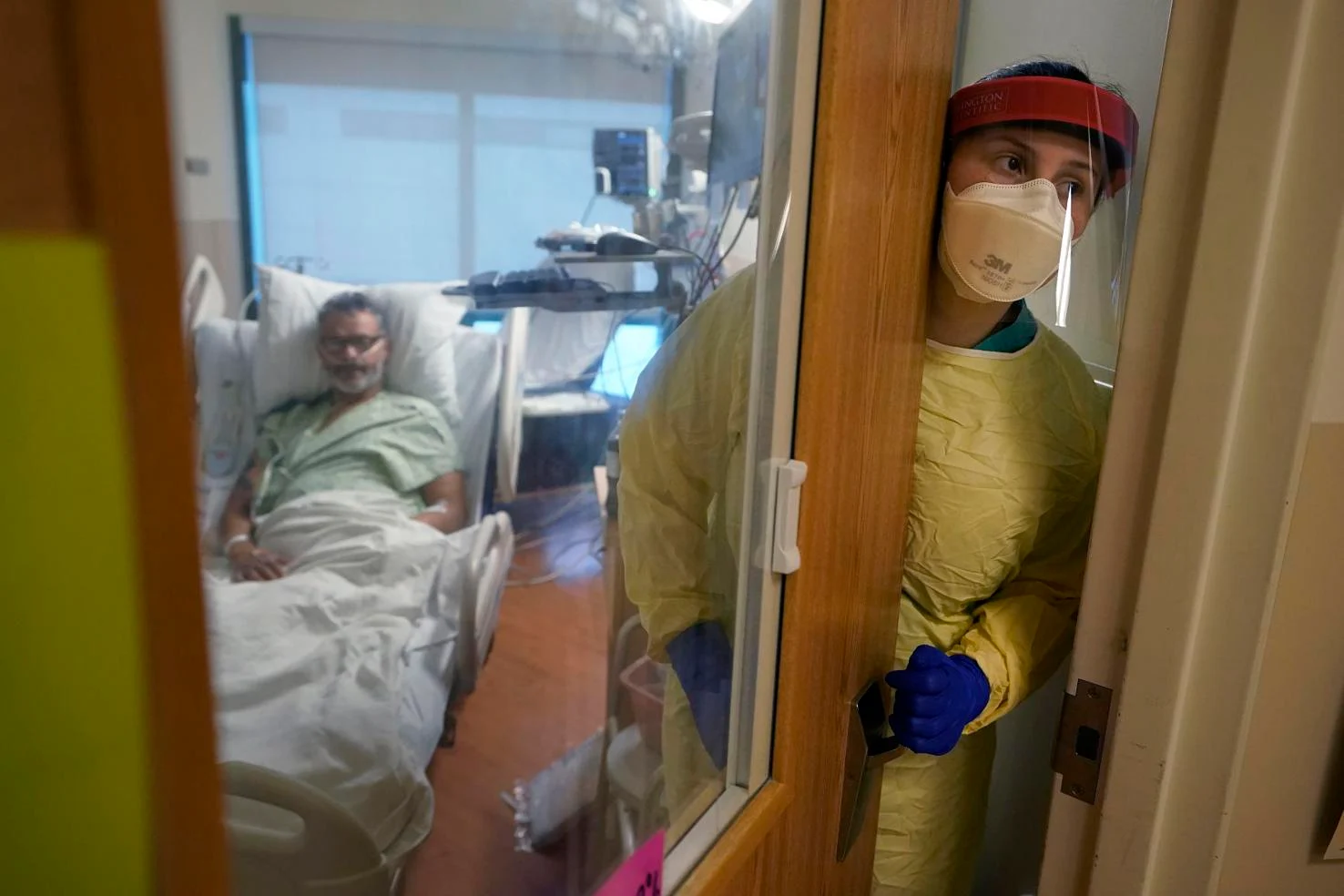
Registered nurse Rachel Chamberlin, of Cornish, right, steps out of an isolation room where Fred Rutherford, of Claremont, left, recovers from COVID-19 at Dartmouth-Hitchcock Medical Center, in Lebanon, in 2022. Hospital are again near capacity with patients, but this time hospitalizations are more varied as COVID-19, flu, RSV are all contributing to the surge. (Eagle Times File photo)
New Hampshire hospitals are back at capacity or near capacity once again following a surge of patients with COVID-19, RSV and the flu, according to the New Hampshire Hospital Association (NHHA). Here in Claremont, though, beds are near capacity — but not all the time.
“Valley Regional Hospital has seen an increase in the number of patients with respiratory-related illnesses, including those associated with flu, COVID-19 and RSV. We have been operating near capacity and on some days at or over capacity on our inpatient unit. Although staffing is strained, we continue to provide services with limited interruption,” said Savannah Tyrrell, communications specialist at Valley Regional Hospital, who noted that employee COVID-19 cases remain low. Tyrrell did not comment as to what exact ailment was tying up beds in their institution, though. “We continue to monitor cases regionally and within the facility.”
In New London, the hospital is at capacity — but not for reasons you’d think.
“We are at full capacity and ironically not with respiratory related illnesses as such cases are making up only a small percentage of our patients,” said Lauren Geddes, chief medical officer at New London Hospital, noting nothing regarding what is keeping their beds at capacity. “We are addressing quite a few RSV/COVID/flu patients in our primary and express care services and want to emphasize the need for our community members to embrace preventative measures, such as staying home when cold and flu symptoms begin, to ensure healthier days ahead.”
Health care professionals like Geddes, Tyrrell and the NHHA are encouraging individuals to go back to masks while visiting a health care provider.
“The decision to change the use of masks in health care settings is driven by data and guidance from health care experts. That data and expert guidance ensures hospitals and health care facilities are safe places for patients to receive both routine and emergency care,” said NHHA President Steve Ahnen.
New London Hospital opted for masks again.
“We did return to staff masking a few weeks ago (and encourage others to do so when entering our facilities) as we need our staff healthy to be able to care for our community,” said Geddes.
Valley Regional was no different.
“We ask all symptomatic patients and visitors to mask while in our facility,” Tyrrell said. “We encourage our community to practice good handwashing and to receive vaccinations for the flu, RSV and COVID-19.”
In Vermont, hospitals are also seeing an uptick in cases and are masking up.
“Springfield Hospital is presently seeing a higher volume of sick patients both in our Emergency Department and our Inpatient Care Unit, partly due to a number of viral illnesses in the area including RSV, COVID, and the flu,” said Doug Nilson, emergency department MD and medical staff president at Springfield Hospital. “Patients are encouraged to wear masks and masks are made available to all patients free of charge. Staff are masking when with patients.”
Preventative measures such as the above have proven a sure-fire way to prevent the exchange of germs. But capacity levels can’t be blamed just on cases alone.
According to the CDC, COVID-19 cases in Sullivan and Merrimack counties in NH remain low. In Vermont, cases are also dubbed low. That pinpoints issues with staffing.
“Hospitals have seen an increased number of patients and staff with respiratory viruses, including the flu, COVID-19 and RSV. Added to an already high level of demand, workforce shortages and a continued inability to discharge patients due to constraints being experienced in long-term care and home care, hospitals are busy, and beds are full,” stated the NHHA press release.
“As part of the NHHA and Dartmouth Health, we are working closely with our system partners to assist with the current capacity issues and are making any necessary adjustments internally to make sure we are providing the care our patients need,” Geddes said.
If folks are feeling unwell with cough, cold, fever or more, Valley Regional’s Urgent Care may be the best option instead of the emergency room.
“Our Urgent Care is available for patients when it is not an emergency, but patients still need help for cough, cold, fever, sore throats, as well as sprains, strains, stitches and other less serious ailments,” said Tyrrell. “Valley Regional does provide testing for flu, COVID-19 and RSV in our Urgent Care. Patients experiencing more serious issues, like difficulty breathing, should visit an emergency department.”
These articles are being shared by partners in The Granite State News Collaborative. For more information visit collaborativenh.org.

 Current Issue - May 2024
Current Issue - May 2024